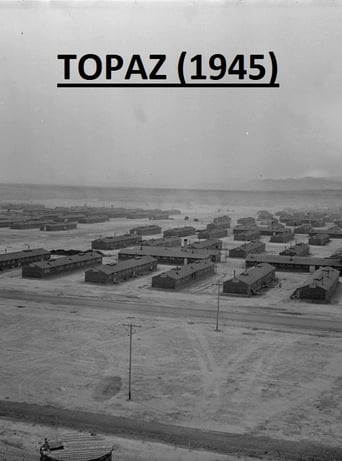

Brilliant and touching
... View MoreAn absolute waste of money
... View MoreAbsolutely brilliant
... View MoreIt is not only a funny movie, but it allows a great amount of joy for anyone who watches it.
... View MoreDave Tatsuno's Topaz takes place in the kind of time period cinema was made to capture. Tatsuno, a Japanese-American business man, spent several years in the Topaz War Relocation Center with his family, one of the many internment camps in America the Japanese were sent to upon Japan's attack on Pearl Harbor in 1942.With the stunning devotion to World War II and Pearl Harbor in my social studies classes, I was stunned never to have learned about the imprisonment of over 100,000 Japanese people during the war. People of any particular Japanese heritage who lived on the Pacific coast of the United States during war times were put into Japanese American internment camps to be monitored and put under surveillance during frantic times in America. They remained in the camps until 1946 when legislation finally found the unconstitutionality of the decision to imprison them under the presidency of Franklin Delano Roosevelt.It's shocking and appalling that a country predicated off of the foundation that all men are created equal and that the country is a haven for opportunity placed thousands of innocent Japanese men, women, and children in sheltered camps and making them live under drudgery and monotony more severe than that of suburban life. Tatsuno captures the day-to-day life in a Utah-based camp named Topaz through a video camera that was smuggled into the camp, and, for forty-eight minutes, invites us in to see what life is like.The exterior is bleak, with shelters and houses all looking the same and all the bunks and bedrooms looking tastelessly bland. Tatsuno shows his family, his friends, and the various children of this particular camp, providing commentary in the background on people, giving the documentary a personal feel as it depicts the entirely impersonal. We see because of the rural area in which the camp resides, dust storms were common, and residents of this particular camp were sometimes forced to remain inside their homes because of high winds and blinding dust storms. To call Topaz entertaining is a misuse of words. If anything, the film provides for a history lesson more interesting than one in a textbook because not only is this topic scarcely brought up but rather than reading a scholar's opinion, here you have an authentic case study.Topaz was elected into the National Film Registry, a selection of films that must be preserved and maintained in the Library of Congress. At least there are some places keen on keeping history alive.NOTE: A specific version of Topaz, as of January 2014, can be viewed on Youtube. There is apparently another version that runs forty-eight minutes in length, is in color, and may or may not featured Tatsuno's commentary, but I'm unsure. Information on Topaz is shockingly limited, and the version I was fortunate enough to see ran seventy-nine minutes, was in black and white due to a lower-quality VHS rip, and featured other selected shorts on the Topaz War Relocation Center towards the end.The film can be viewed here, www.youtube.com/watch?v=KboirnCziusDirected by: Dave Tatsuno.
... View More